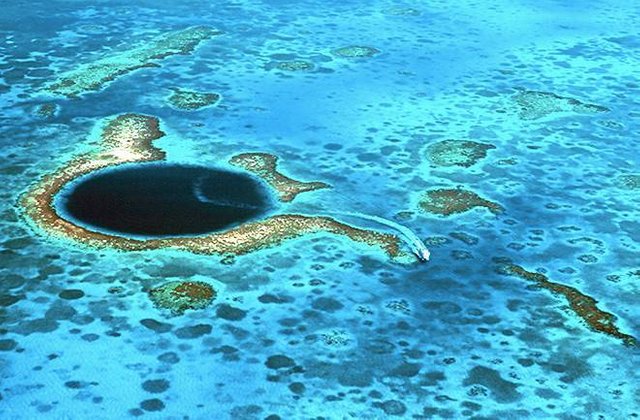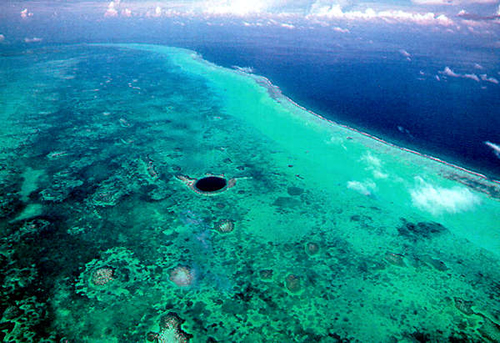The Great Blue Hole is a large sink or "blue hole" off the coast of Belize. It is located near the center of Lighthouse Reef, a small atoll located 100 kilometers from the mainland coast and Belize City. The hole is circular, and has more than 300 meters wide and 123 meters deep. When the glaciation, or last Ice Age, ended 12,000 years ago, the sea level rose, the caves flooded, the roof collapsed and this chasm formed that excites the divers because it harbors many species of fish, sponges and corals . It is believed to be the world's largest phenomenon of its kind. The Great Blue Hole is part of the Belize Barrier Reef Reserves Reserve System, a World Heritage Site by Unesco.

This site was made famous by Jacques-Yves Cousteau, who made a first dive in 1960 and declared this place one of the ten best dive sites in the world. In 1971, Cousteau took his boat, the Calypso, to the hole to trace its depths. The investigations of this expedition confirmed the origin of the hole as typical formations of karst limestone, constituted before the elevation of the sea level in at least four stages, leaving projections with depths of 21, 49 and 91 meters. The stalactites were recovered from submerged caves, confirming their previous formation above sea level. Some of these stalactites are outside the vertical of 10 ° -13 °, in a coherent orientation, indicating that there has also been some geological movement and an inclination of the underlying platform, followed by a long period in the current plane.

This is a popular spot among recreational divers, who are attracted by the opportunity to dive in crystal clear waters and encounter various species of fish, which include giants. We can find several species of sharks such as the nurse, the Caribbean reef shark and the black tip shark. Other species of sharks have been seen, such as the bull shark and hammerhead shark, but sightings are not frequent. Typically, diving trips to the big blue hole are full day excursions, which includes diving into the blue hole and two more dives into the nearby reefs. Caves of similar formation, such as the great blue hole, are well known on the coasts of Belize, and in the Yucatan peninsula, where they are known as "cenotes".
Have a wonderful day.
Reference:
Note: @sirknight started a contest and its daily topics are:
Sunday-light
Monday - Darkness
Tuesday-AnimalDeer
Wednesday-Structures
Thursday-ForcesNature
Friday-AmorBellezaFreedom
Saturday-Agriculture

